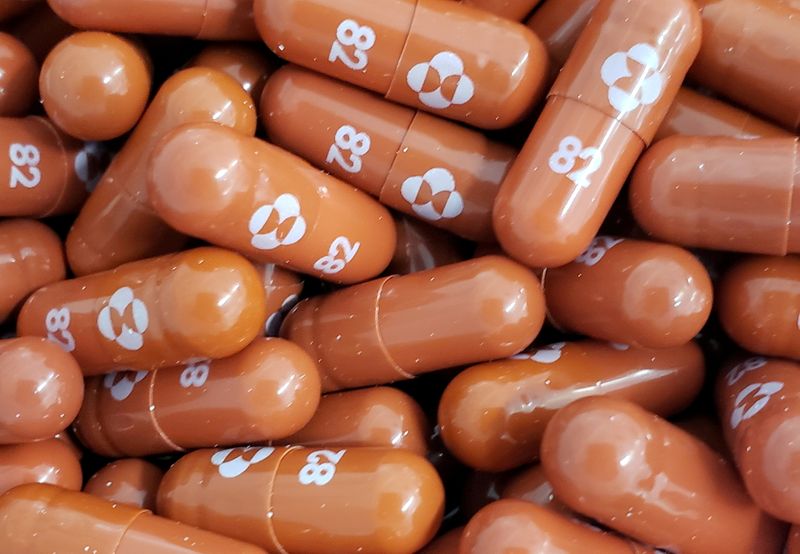Merck COVID-19 pill sparks calls for access for lower income

© Reuters. FILE PHOTO: An experimental COVID-19 treatment pill called molnupiravir being developed by Merck & Co Inc and Ridgeback Biotherapeutics LP, is seen in this undated handout photo released by Merck & Co Inc and obtained by Reuters May 17, 2021. Merck & Co I
By Francesco Guarascio and Michael Erman
(Reuters) – The plan to roll out Merck & Co’s promising antiviral pill to treat COVID-19 risks repeating the inequities of vaccine distribution, potentially leaving the nations with the greatest need once again at the back of the line, international health groups say.
For example, only about 5% of Africa’s population is immunized, creating an urgent need for therapeutics that could keep people out of hospitals. That compares with more than a 70% inoculation rate in most wealthy nations.
Merck on Oct 11 applied for U.S. emergency clearance of the first pill for COVID-19 after it cut hospitalizations and deaths by 50% in a large clinical trial. The medicine, made with Ridgeback Biotherapeutics, could gain authorization as soon as December.
The U.S. drugmaker has taken the unusual pandemic step of licensing several generics of its antiviral molnupiravir before its branded version was even authorized for marketing.
But international health officials said even that is not enough for the medicine to reach many in low- and middle-income countries in large enough numbers, while noting shortcomings and red tape among global organizations that could further slow distribution.
Merck this year plans to produce 10 million treatment courses of the pill, which is taken twice a day for five days, and another 20 million next year.
In addition, its licensing deals with eight Indian drugmakers will allow cheaper generic versions for 109 low- and middle-income countries including in Africa, a move international groups acknowledge is a positive concession.
But as wealthy nations secure molnupiravir supply deals – the United States has already locked up 1.7 million courses with an option for 3.5 million more by January of 2023 at about $700 per course – concerns grow over who might be left out.
NOT MOVING QUICKLY ENOUGH
Merck said it has worked on the technology transfer needed to start generic manufacturing, in contrast to vaccine makers who continue to resist calls to waive patents or allow for generic versions to boost supplies.
But a recent report prepared for the United Nations’ Access to COVID-19 Tools Accelerator program tasked with buying COVID-19 therapeutics for poor countries cited concerns that U.N. agencies were not moving quickly enough to secure adequate volumes of potential new treatments ahead of time, including Merck’s drug.
Medicines Patent Pool (NASDAQ:) (MPP), a United Nations-backed public health organization, has 24 companies signed up and willing to make the drug if Merck agrees to expand the licenses.
“If you’re not in the license, you’re relying on Merck, and it looks to us that that could mean a potential supply shortfall…
Read More: Merck COVID-19 pill sparks calls for access for lower income
